Charles E W Bean, Diaries, AWM38 3DRL 606/250/1 - 1917 - 1937 - Part 4
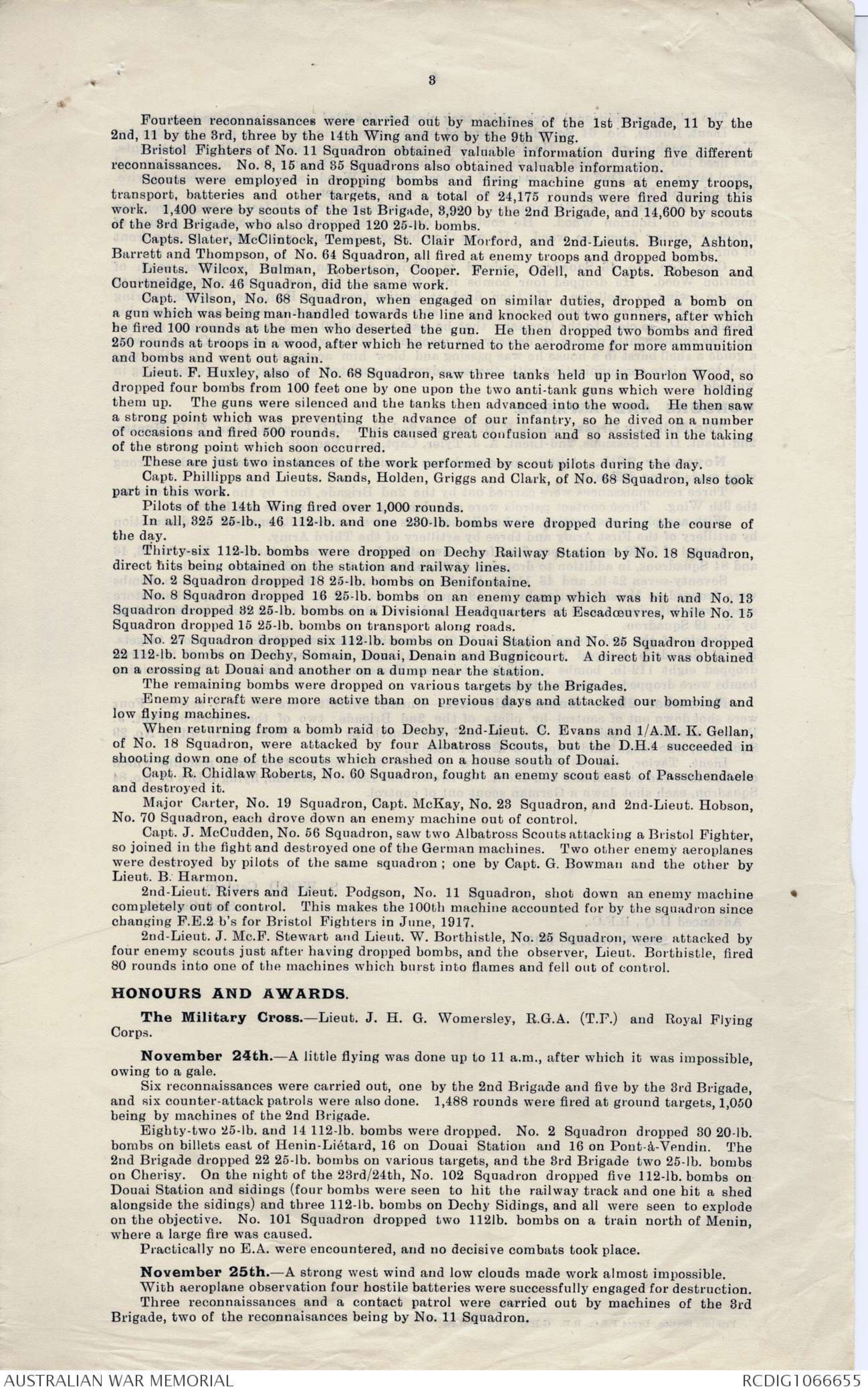
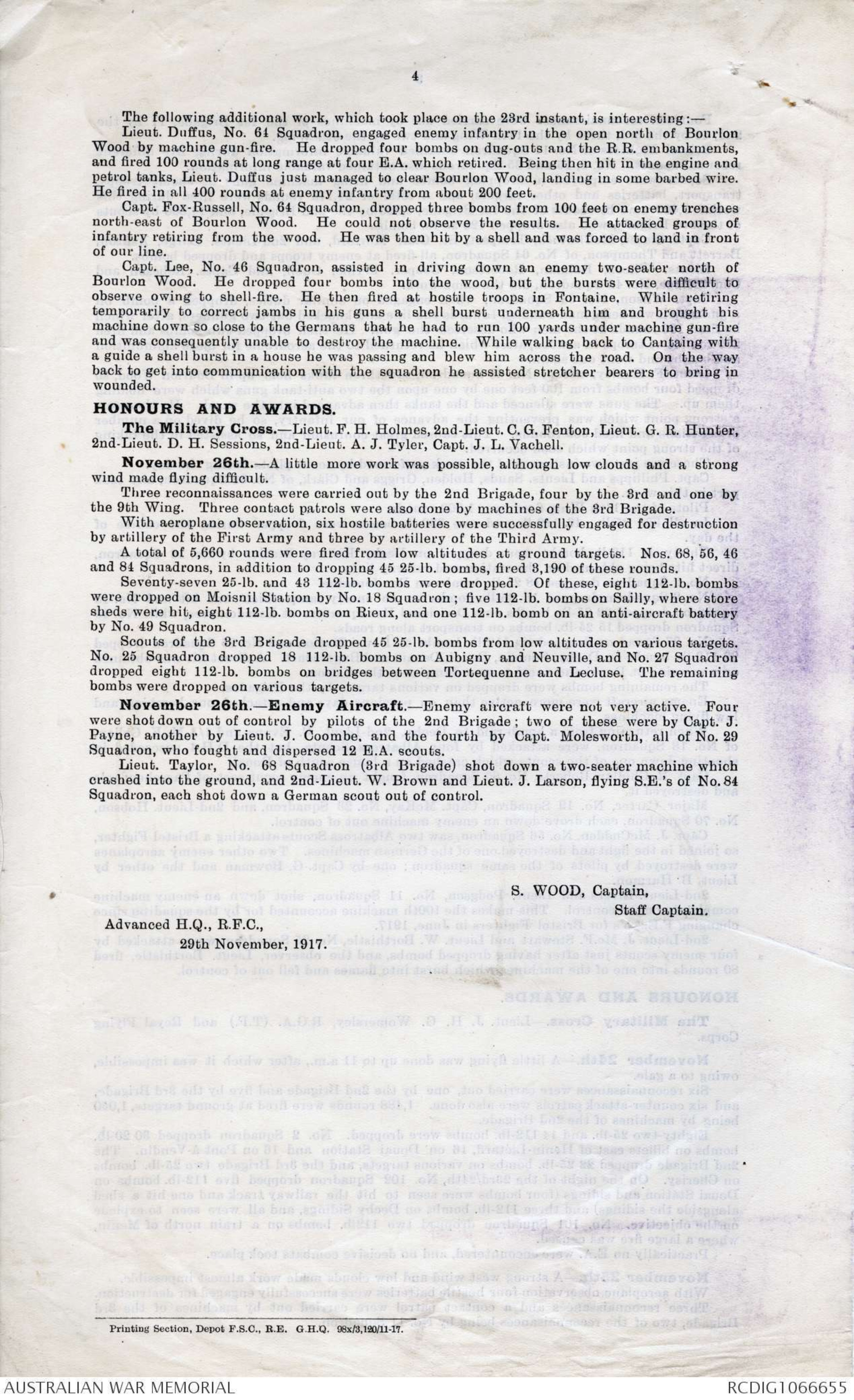
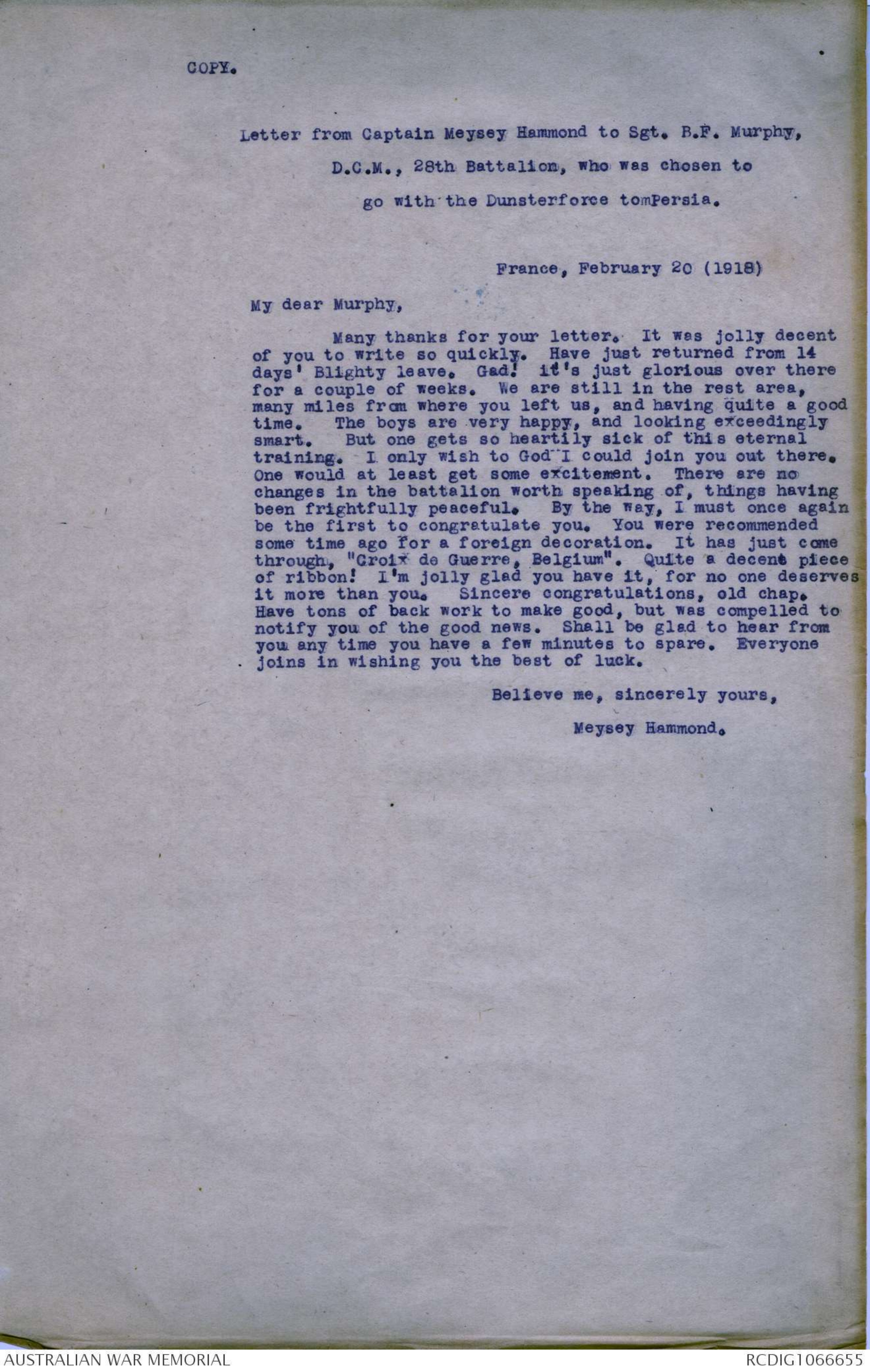
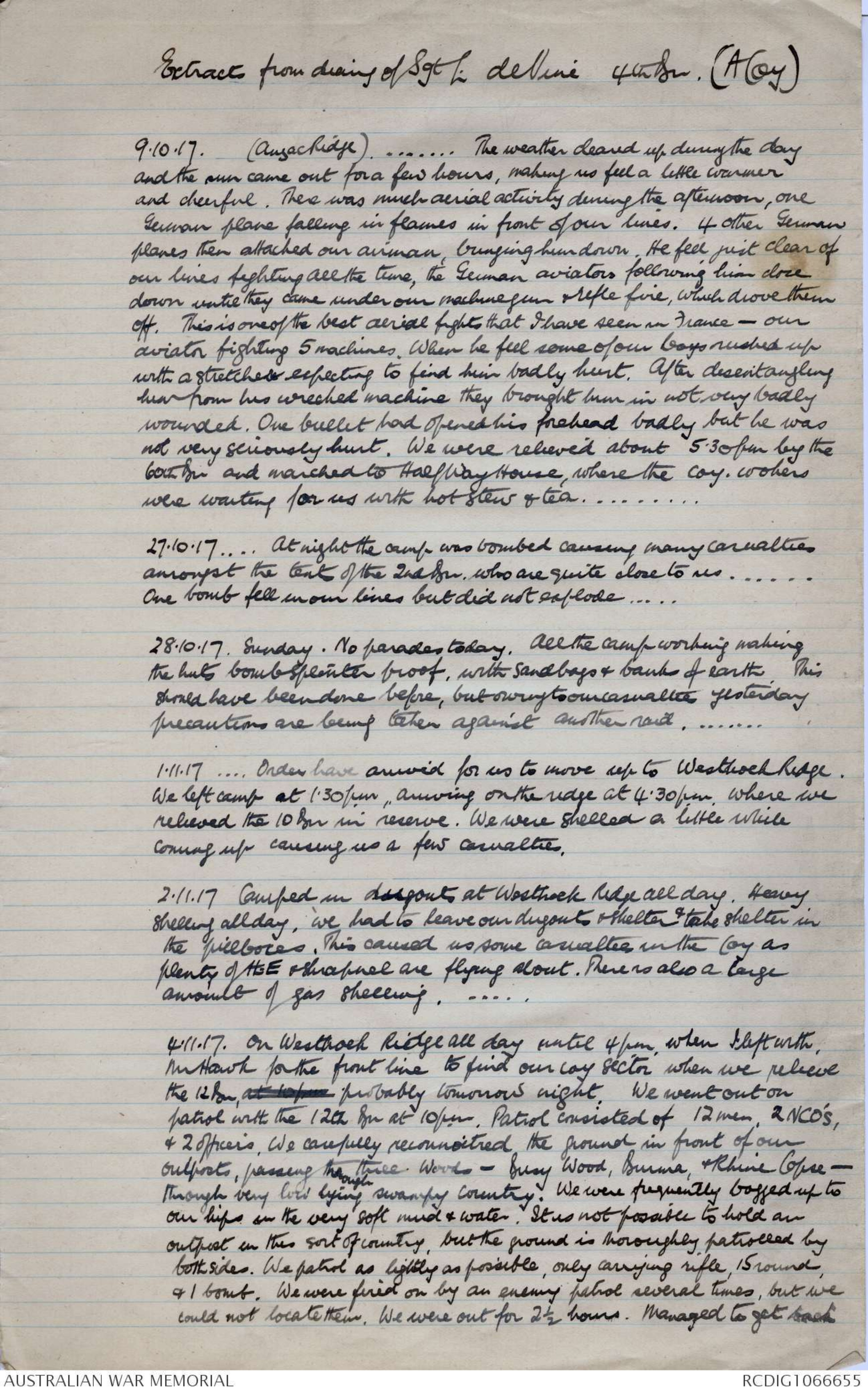
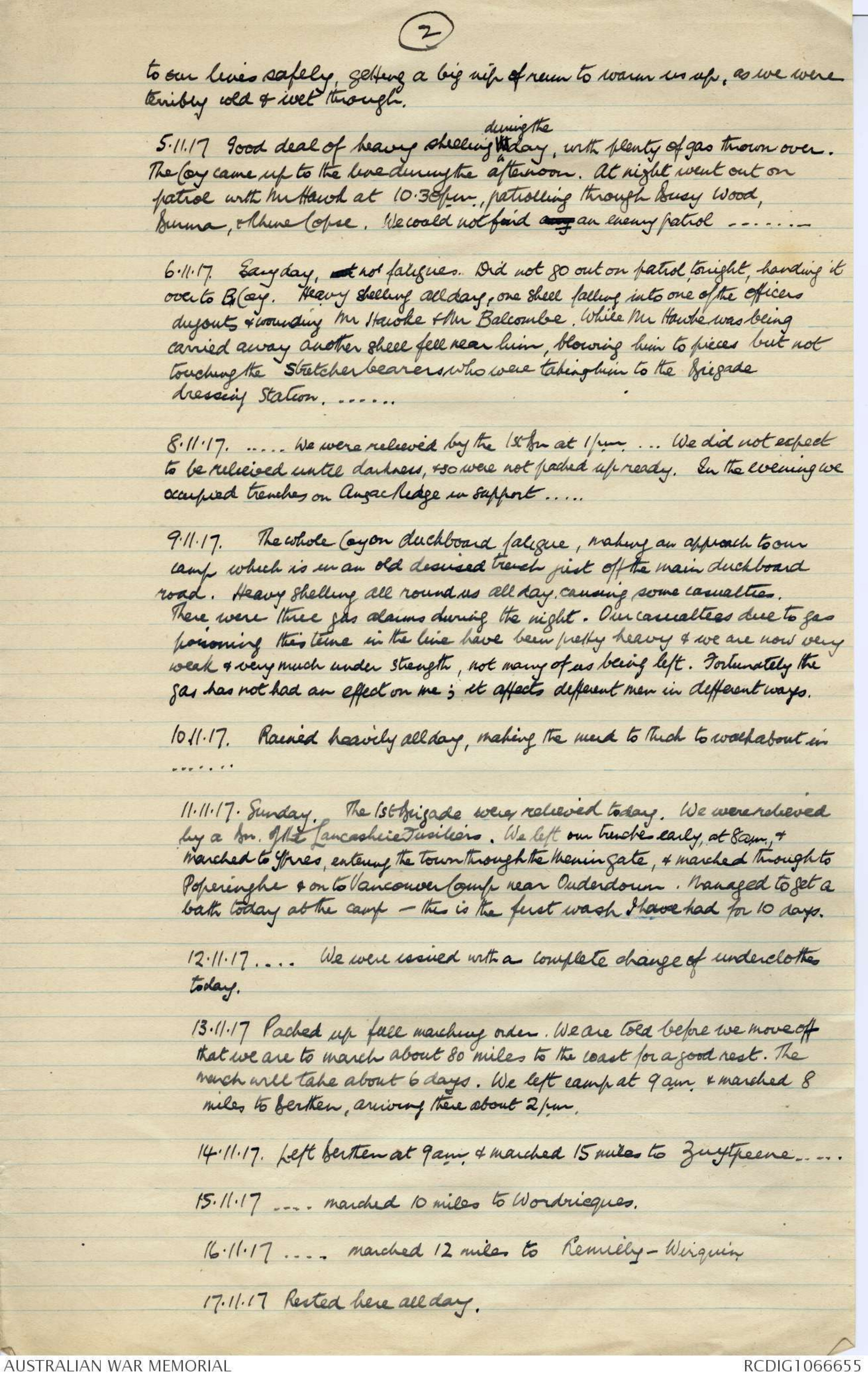
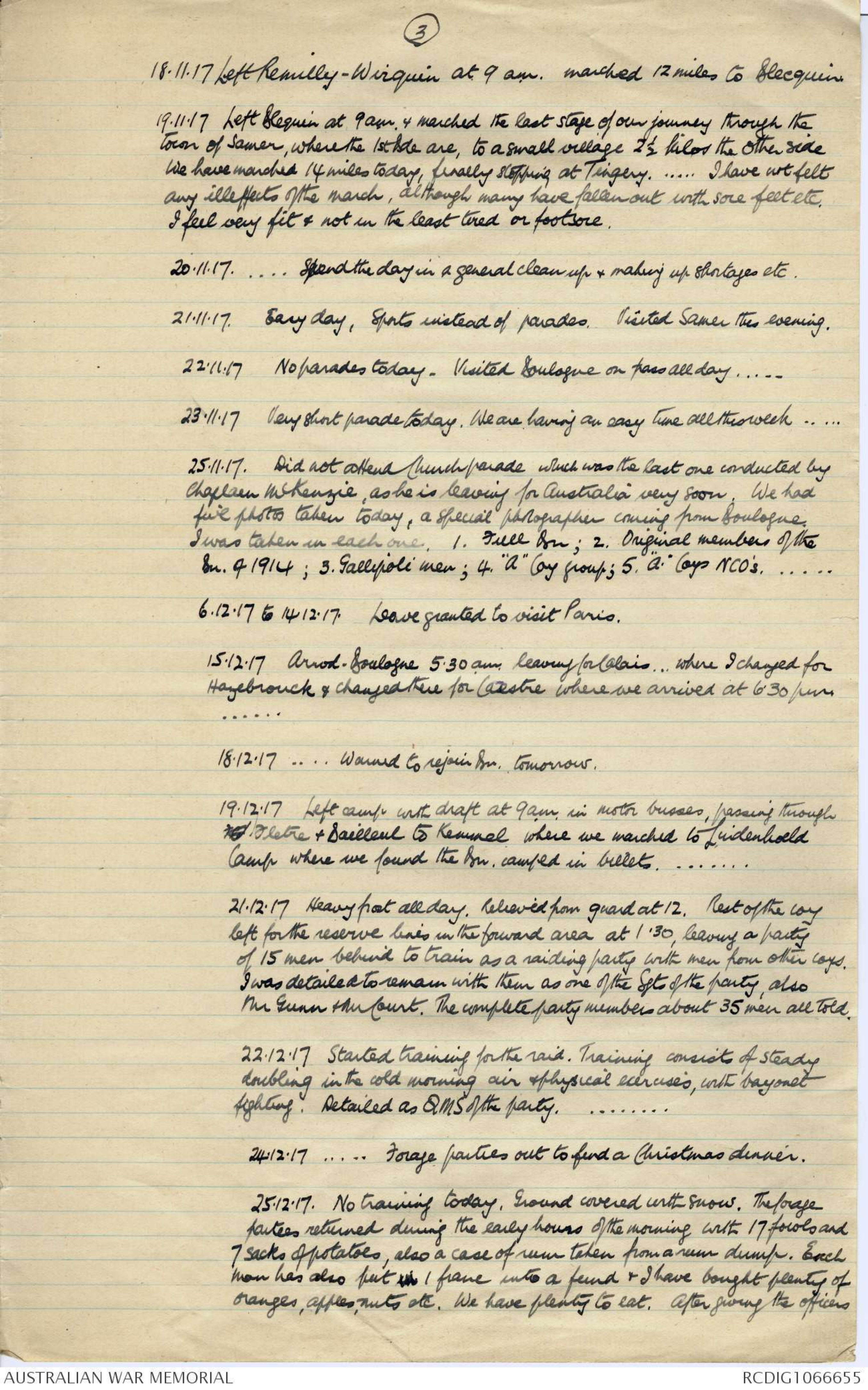
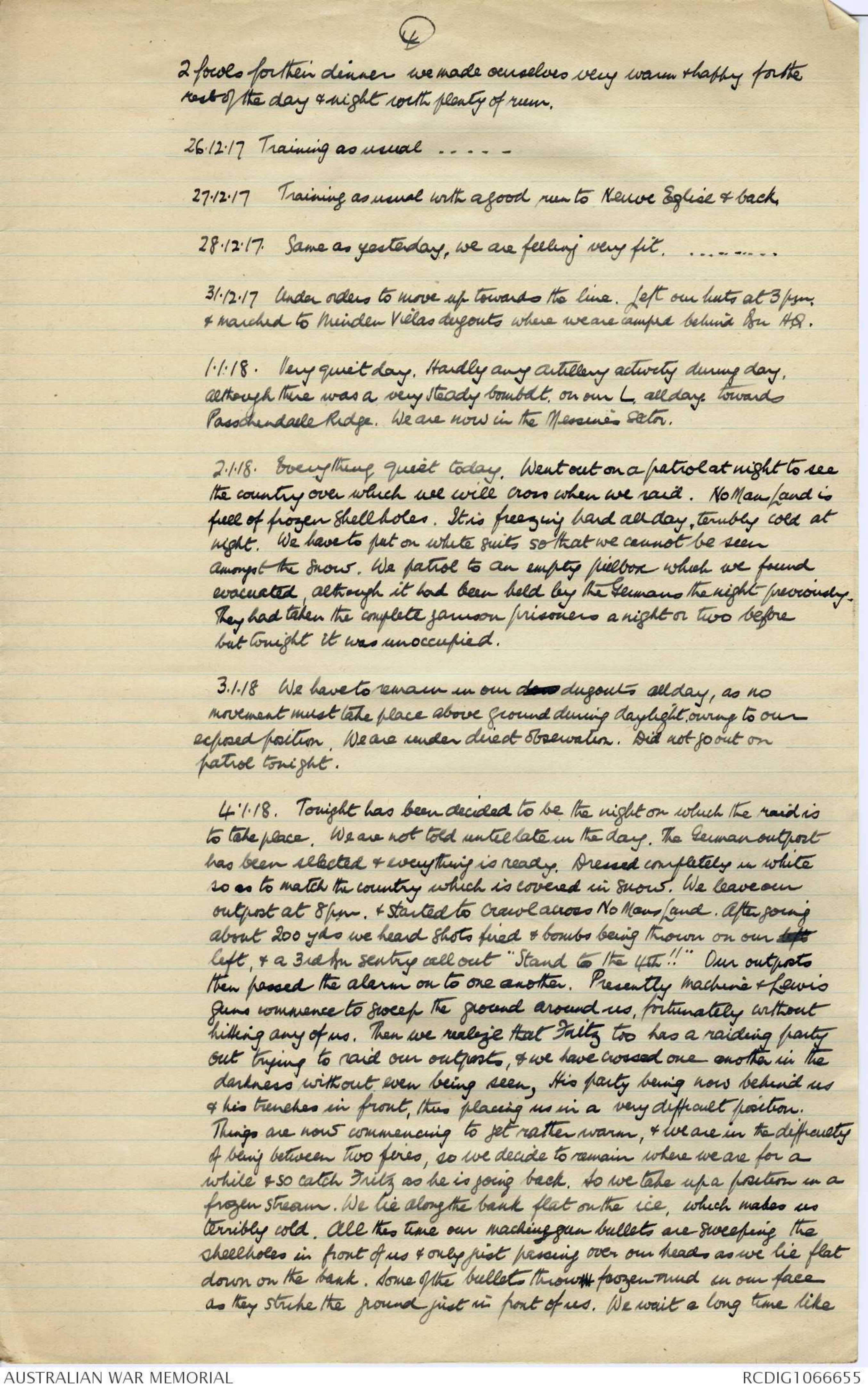
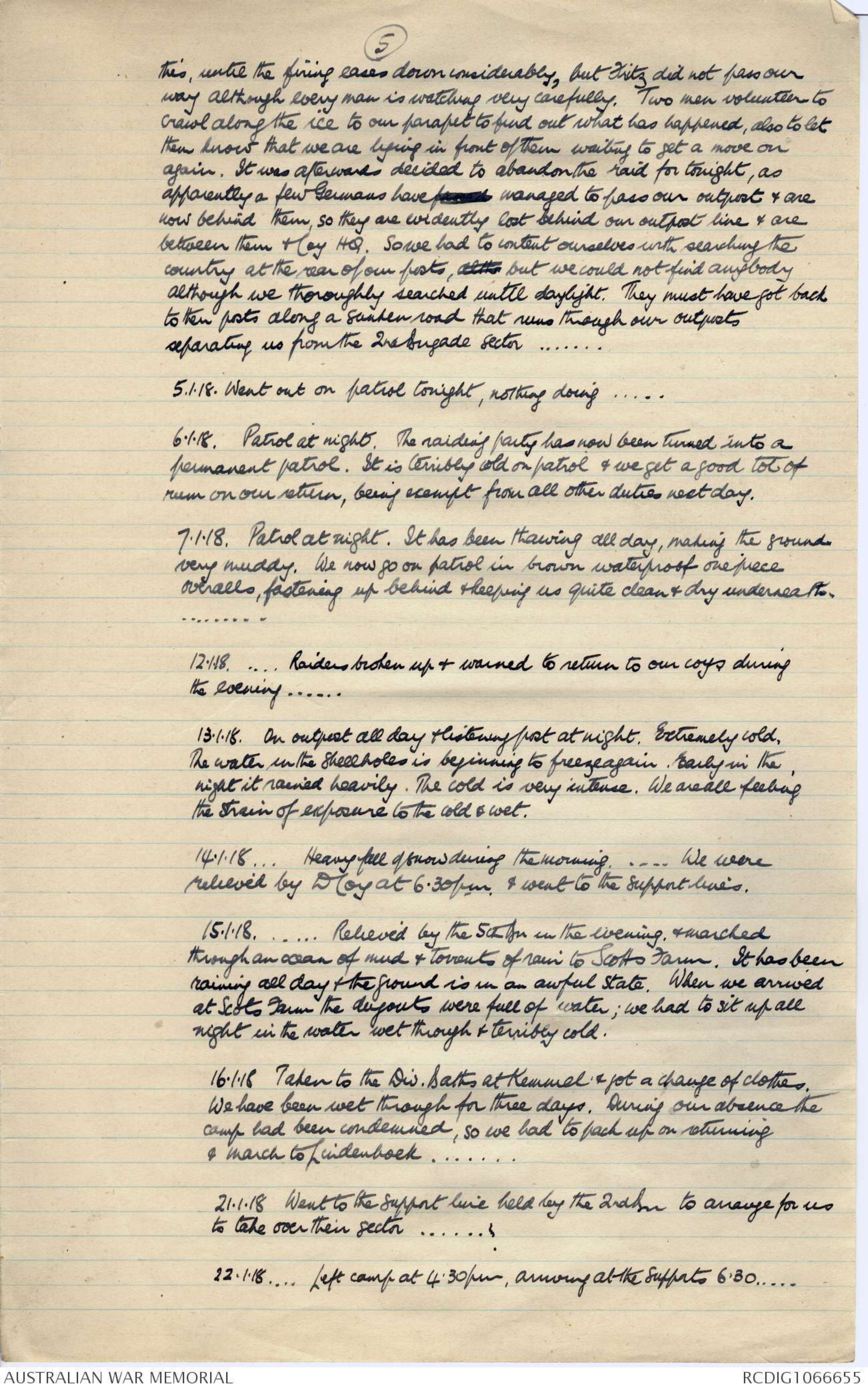
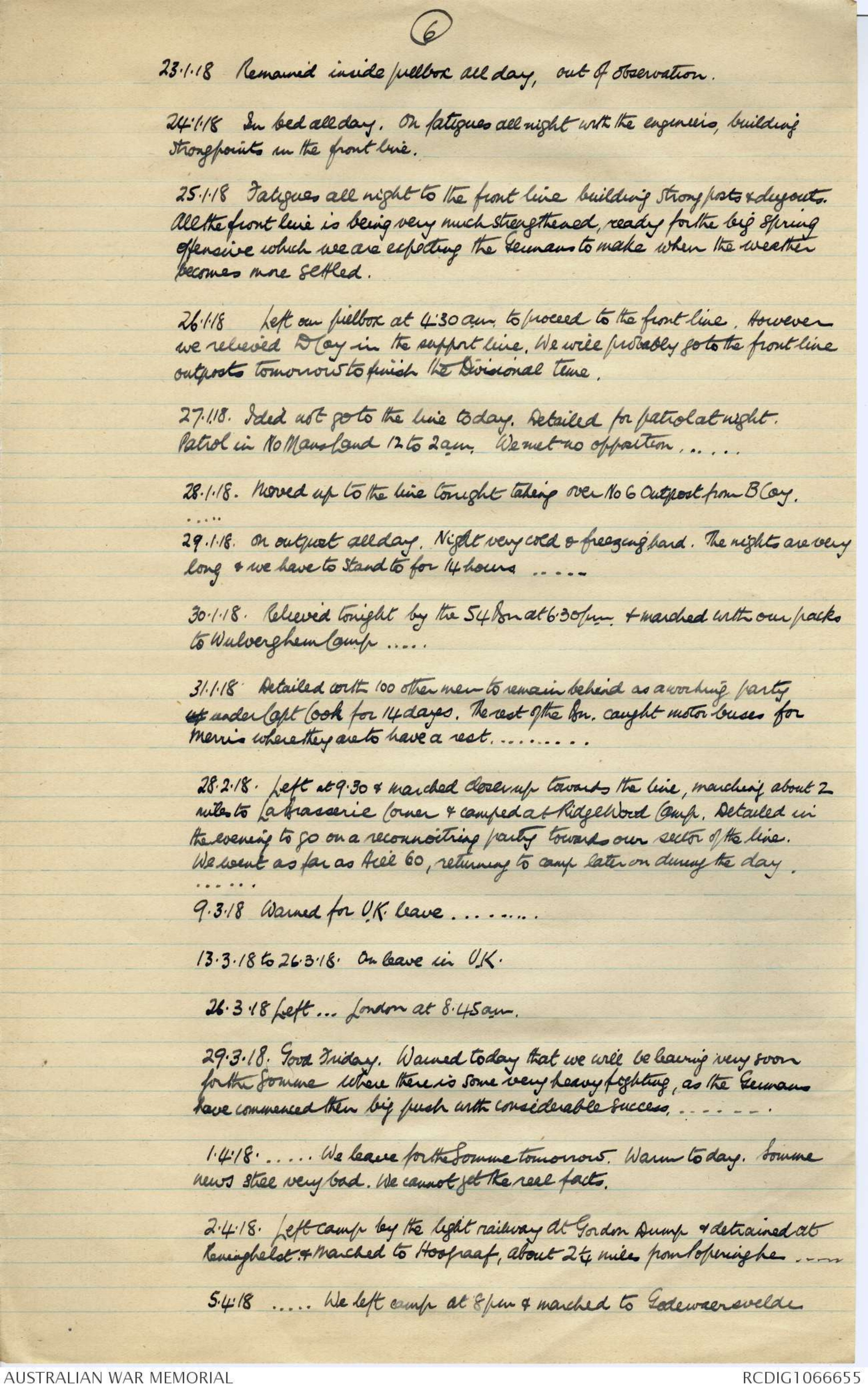
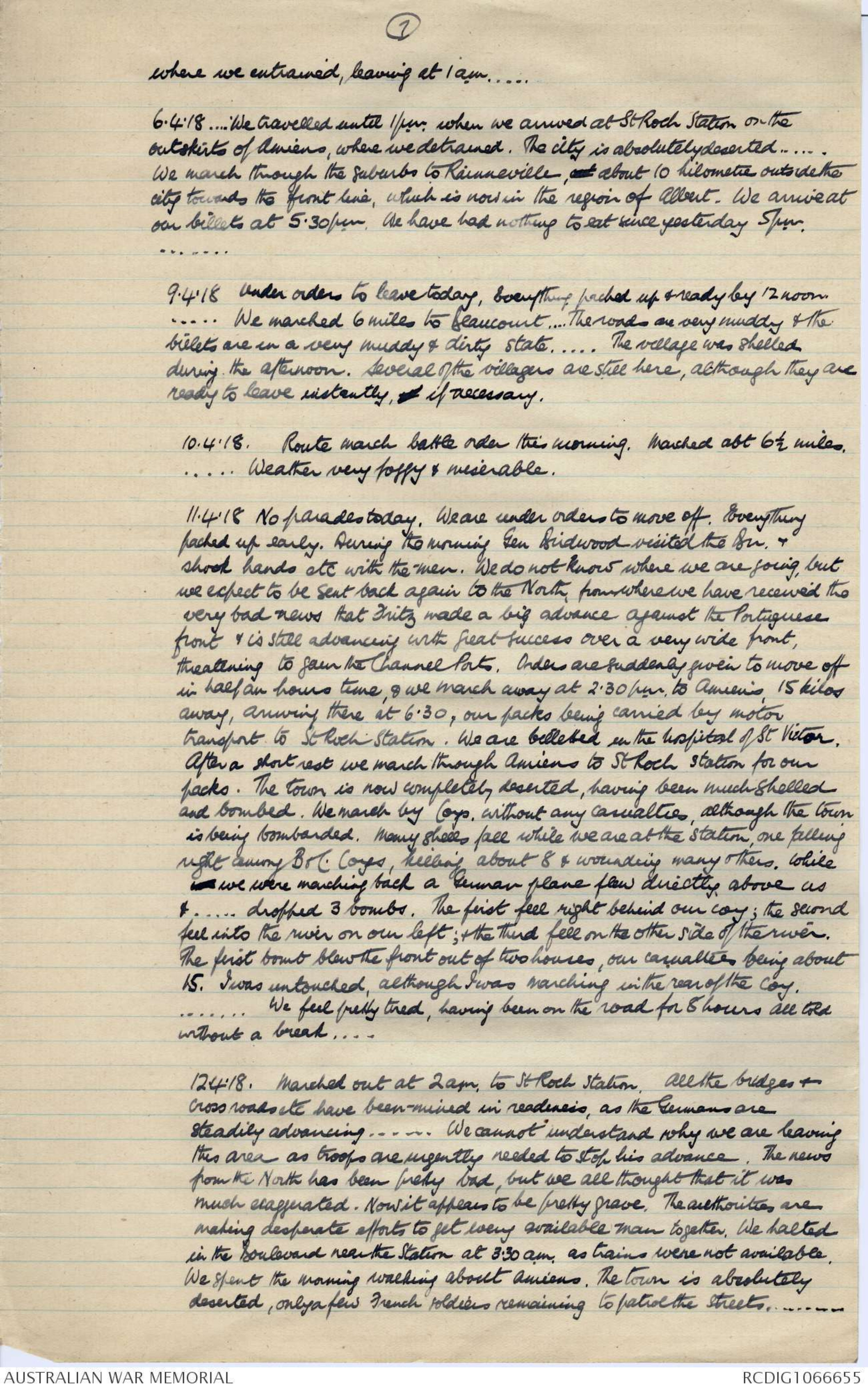
3
Fourteen reconnaissances were carried out by machines of the lst Brigade, 11 by the
2nd, 11 by the 3rd, three by the 14th Wing and two by the 9th Wing.
Bristol Fighters of No. 11 Squadron obtained valuable information during five different
reconnaissances. No. 8, 15 and 35 Squadrons also obtained valuable information.
Scouts were employed in dropping bombs and firing machine guns at enemy troops,
transport, batteries and other targets, and a total of 24,175 rounds were fired during this
work. 1,400 were by scouts of the 1st Brigade, 8920 by the 2nd Brigade, and 14,600 by scouts
of the 3rd Brigade, who also dropped 120 25-lb. bombs.
Capts. Slater, McClintock, Tempest, St. Clair Morford, and 2nd-Lieuts. Burge, Ashton,
Barrett and Thompson, of No. 64 Squadron, all fired at enemy troops and dropped bombs.
Lieuts. Wilcox, Bulman, Robertson, Cooper. Fernie, Odell, and Capts. Robeson and
Courtneidge, No. 46 Squadron, did the same work.
Capt. Wilson, No. 68 Squadron, when engaged on similar duties, dropped a bomb on
a gun which was being man-handled towards the line and knocked out two gunners, after which
he fired 100 rounds at the men who deserted the gun. He then dropped two bombs and fired
250 rounds at troops in a wood, after which he returned to the aerodrome for more ammunition
and bombs and went out again.
Lieut. F. Huxley, also of No. 68 Squadron, saw three tanks held up in Bourlon Wood, so
dropped four bombs from 100 feet one by one upon the two anti-tank guns which were holding
them up. The guns were silenced and the tanks then advanced into the wood. He then saw
a strong point which was preventing the advance of our infantry, so he dived on a number
of occasions and fired 500 rounds. This caused great confusion and so assisted in the taking
of the strong point which soon occurred.
These are just two instances of the work performed by scout pilots during the day.
Capt. Phillipps and Lieuts. Sands, Holden, Griggs and Clark, of No. 68 Squadron, also took
part in this work.
Pilots of the l4th Wing fired over 1,000 rounds.
In all, 823 25-lb, 46 112-lb. and one 230-lb. bombs were dropped during the course of
the day
Thirty six 112-lb. bombs were dropped on Dechy Railway Station by No. 18 Squadron,
direct hits being obtained on the station and railway lines.
No. 2 Squadron dropped 18 23-lb. bombs on Benifontaine.
No. 8 Squadron dropped 16 25-lb. bombs on an enemy camp which was hit and No. 13
Squadron dropped 32 25-lb. bombs on a Divisional Headquarters at Escadoeuvres, while No. 15
Squadron dropped 15 25-lb. bombs on transport along roads.
No. 27 Squadron dropped six 112-lb. bombs on Douai Station and No.25 Squadron dropped
22 112-lb. bombs on Dechy, Somain, Douai, Denain and Bugnicourt. A direct hit was obtained
on a crossing at Douai and another on a dump near the station.
The remaining bombs were dropped on various targets by the Brigades.
Enemy aircraft were more active than on previous days and attacked our bombing and
low flying machines.
When returning from a bomb raid to Dechy, 2nd.Lieut. C. Evans and 1/A.M.K. Gellan,
of No. 18 Squadron, were attacked by four Albatross Scouts, but the D.Hl.4 succeeded in
shooting down one of the scouts which crashed on a house south of Douai.
Capt. R. Chidlaw Roberts, No. 60 Squadron, fought an enemy scout east of Passchendaele
and destroyed it.
Major Carter, No. 19 Squadron, Capt. McKay, No. 23 Squadron, and 2nd-Lieut. Hobson,
No. 70 Squadron, each drove down an enemy machine out of control.
Capt. J. McCudden, No. 56 Squadron, saw two Albatross Scouts attacking a Bristol Fighter
so joined in the fight and destroyed one of the German machines. Two other enemy aeroplanes
were destroyed by pilots of the same squad on; one by Capt. G. Bowman and the other by
Lieut. B. Harmon.
2nd-Lieut. Rivers and Lieut. Podgson, No. 11 Squadron, shot down an enemy machine
completely out of control. This makes the 100th machine accounted for by the squadron since
changing F.E.2 bs for Bristol Fighters in June, 1917.
2nd-Lieut. J. Mc. F. Stewart and Lieut. W. Borthistle, No. 25 Squadron, were attacked by
four enemy scouts just after having dropped bombs, and the observer, Lieut. Borthistle, fired
80 rounds into one of the machines which burst into dames and fell out of control.
HONOURS AND AWARDS.
The Military Cross – Lieut. J. H. G. Womersley, R.G.A. (T.F) and Royal Flying
Corps.
November 24th. – A little flying was done up to 11 a.m, after which it was impossible,
owing to a gale.
Six reconnaissances were carried out, one by the 2nd Brigade and five by the 3rd Brigade,
and six counter-attack patrols were also done. 1,488 rounds were fired at ground targets, 1,050
being by machines of the 2nd Brigade.
Eighty-two 25-lb. and 14 112-lb. bombs were dropped. No. 2 Squadron dropped 30 20.lb.
bombs on billets east of Henin-Liétard, 16 on Douai Station and 16 on Pont-à-Vendin. The
2nd Brigade dropped 22 25-lb. bombs on various targets, and the 3rd Brigade two 25-lb. bombs
on Cherisy. On the night of the 23rd/24th, No. 102 Squadron dropped five 112-lb. bombs on
Douai Station and sidings (four bombs were seen to hit the railway track and one hit a shed
alongside the sidings) and three 112-lb. bombs on Dechy Sidings, and all were seen to explode
on the objective. No. 101 Squadron dropped two 112-lb. bombs on a train north of Menin,
where a large fire was caused.
Practically no E.A. were encountered, and no decisive combats took place.
November 25th. A strong west wind and low clouds made work almost impossible.
With aeroplane observation four hostile batteries were successfully engaged for destruction.
Three reconnaissances and a contact patrol were carried out by machines of the 3rd
Brigade, two of the reconnaisances being by No. 11 Squadron.
4
The following additional work, which took place on the 23rd instant, is interesting:-
Lieut. Duffus, No. 64 Squadron, engaged enemy infantry in the open north of Bourlon
Wood by machine gun-fire. He dropped four bombs on dug outs and the R.R. embankments,
and fired 100 rounds at long range at four E.A which retired. Being then hit in the engine and
petrol tanks, Lieut. Duffus just managed to clear Bourlon Wood, landing in some barbed wire.
He fired in all 400 rounds at enemy infantry from about 200 feet.
Capt. Fox-Russell, No. 64 Squadron, dropped three bombs from 100 feet on enemy trenches
north east of Bourlon Wood. He could not observe the results. He attacked groups of
infantry retiring from the wood. He was then hit by a shell and was forced to land in front
of our line.
Capt. Lee, No. 46 Squadron, assisted in driving down an enemy two-seater north of
Bourlon Wood. He dropped four bombs into the wood, but the bursts were difficult to
observe owing to shell-fire. He then fired at hostile troops in Fontaine. While retiring
temporarily to correct jambs in his guns a shell burst underneath him and brought his
machine down so close to the Germans that he had to run 100 yards under machine gun-fire
and was consequently unable to destroy the machine. While walking back to Cantaing with
a guide a shell burst in a house he was passing and blew him across the road. On the way
back to get into communication with the squadron he assisted stretcher bearers to bring in
wounded.
HONOURS AND AWARDS.
The Military Cross. -Lieut. F. H. Holmes, 2nd-Lieut. C.G. Fenton, Lieut. G. R. Hunter,
2nd-Lieut. D. H. Sessions, 2nd-Lieut. A. J. Tyler, Capt. J. L. Vachell.
November 26th. – A little more work was possible, although low clouds and a strong
wind made flying difficult.
Three reconnaissances were carried out by the 2nd Brigade, four by the 3rd and one by
the 9th Wing. Three contact patrols were also done by machines of the 3rd Brigade.
With aeroplane observation, six hostile batteries were successfully engaged for destruction
by artillery of the First Army and three by artillery of the Third Army.
A total of 5,660 rounds were fired from low altitudes at ground targets. Nos. 68, 56, 46
and 84 Squadrons, in addition to dropping 45 25-1b. bombs, fired 3,190 of these rounds.
Seventy-seven 25-lb. and 48 112-lb. bombs were dropped. Of these, eight 112-lb. bombs
were dropped on Moisnil Station by No. 18 Squadron; five 112-lb. bombs on Sailly, where store
sheds were hit, eight 112-lb. bombs on Rieux, and one 112.lb. bomb on an anti-aircraft battery
by No. 49 Squadron.
Scouts of the 3rd Brigade dropped 45 25-lb. bombs from low altitudes on various targets.
No. 25 Squadron dropped 18 112-lb. bombs on Aubigny and Neuville, and No. 27 Squadron
dropped eight 112-lb. bombs on bridges between Tortequenne and Lecluse. The remaining
bombs were dropped on various targets.
November 26th. – Enemy aircraft –Enemy aircraft were not very active. Four
were shot down out of control by pilots of the 2nd Brigade; two of these were by Capt. J.
Payne, another by Lieut. J. Coombe, and the fourth by Capt. Molesworth, all of No.29
Squadron, who fought and dispersed 12 E.A. scouts.
Lieut. Taylor, No. 68 Squadron (3rd Brigade) shot down a two-seater machine which
crashed into the ground, and 2nd-Lieut. W. Brown and Lieut. J. Larson, flying S.E's of No. 84
Squadron, each shot down a German scout out of control.
S. WOOD, Captain,
Staff Captain
Advanced H.Q. R.F.C.
29th November, 1917.
Printing Section, Depot FSC., R.E. G.H.Q. 98x/3,120/11-17
COPY.
Letter from Captain Meysey Hammond to Sgt. B.F. Murphy,
D.C.M., 28th Battalion, who was chosen to
go with the Dunsterforce to Persia.
France, February 20 (1918)
My dear Murphy,
Many thanks for your letter. It was jolly decent
of you to write so quickly. Have just returned from 14
days' Blighty leave. Gad! it's just glorious over there
for a couple of weeks. We are still in the rest area,
many miles from where you left us, and having quite a good
time. The boys are very happy, and looking exceedingly
smart. But one gets so heartily sick of this eternal
training. I only wish to God I could join you out there.
One would at least get some excitement. There are no
changes in the battalion worth speaking of, things having
been frightfully peaceful. By the way, I must once again
be the first to congratulate you. You were recommended
some time ago for a foreign decoration. It has just come
through, "Croix de Guerre, Belgium". Quite a decent piece
of ribbon! I'm jolly glad you have it, for no one deserves
it more than you. Sincere congratulations, old chap.
Have tons of back work to make good, but was compelled to
notify you of the good news. Shall be glad to hear from
you any time you have a few minutes to spare. Everyone
joins in wishing you the best of luck.
Believe me, sincerely yours,
Meysey Hammond.
Extracts from diary of Sgt L deVine 4th Bn. (ACoy)
9.10.17. (AnzacRidge)...... The weather cleared up during the day
and the sun came out for a few hours, making us feel a little warmer
and cheerful. There was much aerial activity during the afternoon, one
German plane falling in flames a front of our lines. 4 other German
planes than attacked our airman, bringing him down. He fell just clear of
our lines fighting all the time, the German aviators following him close
down until they came under machine gun fire, which drove them
off. This is one of the best aerial fights that I have seen in France – our
aviator fighting 5 machines. When he fell some of our boys rushed up
with a stretcher expecting to find him badly hurt. After disentangling
him from his wrecked machine they brought him in not very badly
wounded. One bullet had opened his forehead badly but he was
not very seriously hurt. We were relieved about 5.30pm by the
60th Bn and marched to HalfWay House, where the coy. cookers
were waiting for us with hot stew & tea........
27.10.17 .... At night the camp was bombed causing many casualties
amongst the tents of the 2nd Bn who are quite close to us ......
One bomb fell in our lines but did not explode .....
28.10.17. Sunday. No parades today. All the camp working making
the huts bomb splinter proof, with sandbags & banks of earth. This
should have been done before, but owing to our casualties yesterday
precautions are being taken against another raid ......
1.11.17 ..... Orders have arrived for us to move up to Westhoek Ridge.
We left camp at 1.30pm., arriving on the ridge at 4.30pm where we
relieved the 10 Bn in reserve. We were shelled a little while
coming up causing us a few casualties.
2.11.17 Camped in dugouts at Westhoek Ridge all day, Heavy
shelling all day, we had to leave our dugouts & shelter & take shelter in
the pillboxes. This caused us some casualties in the Coy as
plenty of HE & schrapnel are flying about. There is also a large
amount of gas shelling. .....
4.11.17. On Westhoek Ridge all day until 4pm, when I left with
Mr Hawk for the front line to find our coy sector when we relieve
the 12 Bn, probably tomorrow night. We went out on
patrol with the 12 Bn at 10p.m. Patrol consisted of 12 men, 2 NCO's,
& 2 officers. We carefully reconnoitred the ground in front of our
outposts, passing through twice. Woods - Busy Wood, Burma & Rhine Copse-
through very low lying swampy country. We were frequently bogged up to
our hips in the very soft mud & water. It is not possible to hold an
outpost in this sort of country, but the ground is thoroughly patrolled by
both sides. We patrol as lightly as possible, only carrying rifle, 15 rounds
& 1 bomb. We were fired on by an enemy patrol several times, but we
could not locate them. We were out for 2½ hours. Managed to get back
2
to our lines safely, getting a big nip of rum to warm us up, as we were
terribly cold & wet through.
5.11.17 Good deal of heavy shelling ∧during the day, with plenty of gas thrown over.
The Coy came up to the line during the afternoon. At night went out on
patrol with Mr Hawk at 10.30p.m., patrolling through Busy Wood,
Burma, Rhine Copse. We could not find any an enemy patrol ......
6.11.17. Easy day, not not fatigues. Did not go out on patrol tonight, handing it
over to BCoy. Heavy shelling all day, one shell falling into one of the officers
dugouts & wounding Mr Hawke & Mr Balcombe. While Mr Hawke was being
carried away another shell fell near him, blowing him to pieces but not
touching the stretcher bearers who were taking him to the brigade
dressing station. .....
8.11.17. ..... We were relieved by the 1st Bn at 1pm ... We did not expect
to be relieved until darkness, & so were not packed up ready. In the evening we
occupied trenches on Anzac Ridge in support ....
9.11.17. The whole Coy on duckboard fatigue, making an approach to our
camps which is in an old disused trench just off the main duckboard
road. Heavy shelling all round us all day causing some casualties.
There were three gas alarms during the night. Our casualties due to gas
poisoning this time in the line have been shelling pretty heavy & we are now very
weak & very much under strength, not many of us being left. Fortunately the
gas has not had an effect on me; it affects different men in different ways.
10.11.17. Rained heavily all day, making the mud to thick to work about in
11.11.17. Sunday. The 1st Brigade were relieved today. We were relieved
by a Bn of the Lancashire Fusiliers. We left our trenches early at 8a.m., &
marched to Ypres, entering the town through the Menin Gate, & marched through to
Poperinghe & on to Vancouver Camp near Ouderdom. Managed to get a
bath today at the camp - this is the first wash I have had for 10 days.
12.11.17 ..... We were issued with a complete change of underclothes
today.
13.11.17 Packed up full marching order. We are told before we move off
that we are to march about 80 miles to the coast for a good rest. The
march will take about 6 days. We left camp at 9 a.m. & marched 8
miles to Berthen, arriving there about 2pm.
14.11.17. Left Berthen at 9a.m. & marched 15 miles to Zuytpeene .....
15.11.17 ..... marched 10 miles to Wordrieques.
16.11.17 ..... marched 12 miles to Remilly-Wirquin
17.11.17 Rested here all day.
3
18.11.17 Left Remilly-Wirquin at 9 a.m. marched 12 miles to Blecquin
19.11.17 Left Blequin at 9a.m. & marched the last stage of our journey through the
town of Samer, where the 1st Bde are, to a small village 2½ miles the other side
We have marched 14 miles today, finally stopping at Tingery. ..... I have not felt
any ill effects of the march, although many have fallen out with sore feet etc.
I feel very fit & not in the least tired or footsore.
20.11.17. ..... Spend the day in a general clean up & making up shortages etc.
21.11.17. Easy day, sports instead of parades. Visited Samer this evening.
22.11.17 No parades today. Visited Boulogne on pass all day.....
23.11.17 Very short parade today, We are having an easy time all this week ....
25.11.17 Did not attend church parade which was the last one conducted by
Chaplain McKenzie as he is leaving for Australia very soon. We had
five photos taken today, a special photographer coming from Boulogne.
I was taken in each one. 1. Full Bn ; 2. Original members of the
Bn. 41914 ; 3. Gallipoli men ; 4. "A" Coy group ; 5. "A" Coys NCO's .....
6.12.17 to 14.12.17. Leave granted to visit Paris.
15.12.17 Arrvd. Boulogne 5.30a.m. leaving for Calais ... where I changed for
Hazebrouck & changed there for Caestre where we arrived at 6.30pm
18.12.17 ..... Warned to rejoin Bn. tomorrow.
19.12.17 Left camp with draft at 9a.m. in motor busses, passing through Fl Fletre & Bailleul to Kemmel where we marched to Luidenboeld
Camp where we found the Bn. camped in billets. ....
21.12.17 Heavy frost all day. Relieved from guard at 12. Rest of the coy
left for the reserve lines in the forward area at 1.30 leaving a party
of 15 men behind to train as a raiding party with men from other coys.
I was detailed to remain with them as one of the Sgts of the party, also
Mr Gunn & Mr Court. The complete party members about 35 men all told.
22.12.17 Started training for the raid. Training consists of steady
doubling in the cold morning air & physical exercises, with bayonet
fighting. Detailed as QMS of the party. .....
24.12.17 ..... Forage parties out to find a Christmas dinner.
25.12.17. No training today, ground covered with snow. The forage
parties returned during the early hours of the morning with 17 fowls and
7 sacks of potatoes, also a case of rum taken from a rum dump. Each
man has also put the 1 franc into a fund & I have bought plenty of
oranges, apples, nuts etc. We have plenty to eat. After giving the officers
4
2 fowls for their dinner we made ourselves very warm & happy for the
rest of the day & night with plenty of rum.
26.12.17 Training as usual .....
27.12.17 Training as usual with a good run to Neuve Eglise & back
28.12.17 Same as yesterday, we are feeling very fit. .......
31.12.17 Under orders to move up towards the line. Left our huts at 3p.m.
& marched to Minden Vielas dugouts where we are camped behind Bn HQ.
1.1.18. Very quiet day. Hardly any artillery activity during day.
Although there was a very steady bombdt. on our L all day towards
Passchendaele Ridge. We are now in the Messines sector.
2.1.18. Everything quiet today. Went out on a patrol at night to see
the country over which we will cross when we raid. No Mans Land is
full of frozen shellholes. It is freezing hard all day, terribly cold at
night. We have to put on white suits so that we cannot be seen
amongst the snow. We patrol to an empty pillbox which we found
evacuated although it had been held by the Germans the night previously.
They had taken the complete garrison prisoners a night or two before
but tonight it was unoccupied.
3.1.18 We have to remain in our dug dugouts all day, as no
movement must take place above ground during daylight owing to our
exposed position. We are under direct observation. Did not go out on
patrol tonight.
4.1.18. Tonight has been decided to be the night on which the raid is
to take place. We are not told until late in the day. The German outpost
has been selected & everything is ready. Dressed completely in white
so as to match the country which is covered in snow. We leave our
outpost at 8p.m. & started to crawl across No Mans Land. After going
about 200 yds we heard shots fired & bombs being thrown on our ldft
left, & a 3rd Bn sentry call out "Stand to the 4th!!" Our outposts
then pressed the alarm on to one another. Presently machine & Lewis
guns commence to sweep the ground around us, fortunately without
hitting any of us. Then we realize that Fritz too has a raiding party
out trying to raid our outposts, & we have crossed one another in the
darkness without even being seen, this party being now behind us
& his trenches in front, thus placing us in a very difficult position.
Things are now commencing to get rather warm & we are in the difficulty
of being between two fires, so we decide to remain where we are for a
while & so catch Fritz as he is going back. So we take up a position in a
frozen stream. We lie along the bank flat on the ice, which makes us
terribly cold. All the time our machine gun bullets are sweeping the
shellholes in front of us & only just passing over our heads as we lie flat
down on the bank. Some of the bullets thrownn frozen mud in our faces
as they strike the ground just in front of us. We wait a long time like
5
this, until the firing eases down considerably, but Fritz did not pass our
way although every man is watching very carefully. Two men volunteer to
crawl along the ice to our parapet to find out what has happened, also to let
them know that we are lying in front of them waiting to get a move on
again. It was afterwards decided to abandon the raid for tonight, as
apparently a few Germans have found managed to pass our outpost & are
now behind them, so they are evidently not behind our outpost line & are
between them & Coy HQ. So we had to content ourselves with searching the
country at the rear of our posts, althe but we could not find anybody
although we thoroughly searched until daylight. They must have got back
to their posts along a sunken road that runs through our outposts
separating us from the 2nd Brigade sector .....
5.1.18. Went out on patrol tonight, nothing doing ....
6.1.18. Patrol at night. The raiding party has now been turned into a
permanent patrol. It is terribly cold on patrol & we get a good tot of
rum on our return, being exempt from all other duties next day.
7.1.18. Patrol at night. It has been thawing all day, making the grounds
very muddy. We now go on patrol in brown waterproof one piece
overalls , fastening up behind & keeping us quite clean & dry underneath.
.....
12.1.18 ..... Raiders broken up & warned to return to our coys during
the evening .....
13.1.18. On outpost all day & listening post at night. Extremely cold,
the water in the shellholes is beginning to freeze again. Early in the
night it rained heavily. The cold is very intense. We are all feeling
the strain of exposure to the cold & wet.
14.1.18 ... Heavy fall of snow during the morning ..... We were
relieved by D Coy at 6.30p.m. & went to the support lines.
15.1.18. ..... Relieved by the 5th Bn in the evening & marched
through an ocean of mud & torrents of rain to Scotts Farm. It has been
raining all day & the ground is in an awful state. When we arrived
at Scots Farm the dugouts were full of water ; we had to sit up all
night in the water wet through & terribly cold.
16.1.18 Taken to the Div. Baths at Kemmel & got a change of clothes.
We have been wet through for three days. During our absence the
camp had been condemned, so we had to pack up on returning
& march to Lindenboek .....
21.1.18 Went to the support line held by the 2nd Bn to arrange for us
to take over their sector .....
22.1.18 ..... Left camp at 4.30pm, arriving at the Supports 6.30 ......
6
23.1.18 Remained inside pillbox all day, out of observation.
24.1.18 In bed all day. On fatigues all night with the engineers, building
strongpoints in the front line.
25.1.18 Fatigues all night to the front line building strong posts & dugouts.
All the front line is being very much strengthened, ready for the big Spring
offensive which we are expecting the Germans to make when the weather
becomes more settled.
26.1.18 Left our pillbox at 4.30 a.m. to proceed to the front line, However
we relieved D Coy in the support line. We will probably go to the front line
outposts tomorrow to finish the Divisional time.
27.1.18. I did not go to the line today. Detailed for patrol at night.
Patrol in No Mans Land 12 to 2 a.m. We met no opposition.....
28.1.18. Move up to the line tonight taking over No. 6 Outpost from B Coy.
29.1.18. On outpost all day. Night very cold & freezing hard. The nights are very
long & we have to stand to for 14 hours.....
30.1.18. Relieved tonight by the 54 Bn at 6.30 p.m. & marched with our packs
to Wulverghem Camp.....
31.1.18 Detailed with 100 other men to remain behind as a working party
up under Capt Cook for 14 days. The rest of the Bn. caught motor buses for
Merris where they are to have a rest......
28.2.18. Left at 9.30 & marched closer up towards the line, marching about 2
miles to La Brasserie Corner & camped at Ridge Wood camp. Detailed in
the evening to go on a reconnoitring party towards our sector of the line.
We went as far as Hill 60, returning to camp later on during the day.
9.3.18 Warned for U.K. leave......
13.3.18 to 26.3.18. On leave in U.K.
26.3.18 Left ... London at 8.45a.m.
29.3.18 Good Friday. Warned today that we will be leaving very soon
for the Somme where there is some very heavy fighting, as the Germans
have commenced their big push with considerable success.....
1.4.18..... We leave for the Somme tomorrow. Warm today. Somme
news still very bad. We cannot get the real facts.
2.4.18. Left camp by the light railway at Gordon Dump & detrained at
Reninghelst & marched to Hosgraaf, about 2¼ miles from Poperinghe.....
5.4.18 ..... We left camp at 8pm & marched to Godewaersvelde
7
where we entrained, leaving at 1 a.m.....
6 4.18......We travelled until 1 p.m. when we arrived at St Roch Station on the
outskirts of Amiens, where we detrained. The city is absolutely deserted.....
We march through the suburbs to Rainneville, at about 10 miles outside the
city towards the front line which is now in the region of Albert. We arrive at
our billets at 5.30 p.m. we have had nothing to eat since yesterday 5 p.m.
9.4.18 Under orders to leave today, Everything packed up & ready by 12 noon.
We marched 6 miles to Beaucourt...The roads are very muddy & the
billets are in a very muddy & dirty state.... The village was shelled
during the afternoon. Several of the villagers are still here, although they are
ready to leave instantly, xx if necessary.
10.4.18. Route march battle order this morning. Marched abt 6½ miles.
..... Weather very foggy & miserable.
11.4.18. No Parades today. We are under orders to move off. Everything
packed up early. During the morning Gen Birdwood visited the Bn. &
shook hands etc with the men. We do not know where we are going, but
we expect to be sent back again to the North from where we have received the
very bad news that Fritz made a big advance against the Portuguese
front & is still advancing with great success over a very wide front,
threatening to gain the Channel Ports. Orders are suddenly given to move off
in half an hours time, & we march away at 2.30 p.m. to Amiens, 15 kilos
away, arriving there at 6.30, our packs being carried by motor
transport to St Roch Station. We are billeted in the hospital of St Victor.
After a short rest we march through Amiens to St Roch station for our
packs. The town is now completely deserted, having been much shelled
and bombed. We march by Coys. without any casualties, although the town
is being bombarded. Many shells fall while we are at the station, one falling
right among B & C. Coys, killing about 8 & wounding many others. While
xx we were marching back a Gunner plane flew directly above us
x..... dropped 3 bombs. The third fell on the other side of the river.
The first bomb blew the front out of two houses, our casualties being about
15. I was untouched, although I was marching in the rear of the Coy.
We feel pretty tired, having been on the road for 8 hours all told
without a break.....
12.4.18. Marched out at 2 a.m. to St Roch station. All the bridges &
cross roads etc have been mined in readiness, as the Germans are
steadily advancing..... We cannot understand why we are leaving
this area as troops are urgently needed to stop his advance. The news
from the North has been pretty bad, but we all though that it was
much exaggerated. Now it appears to be pretty grave. The authorities are
making desperate efforts to get every available man together. We halted
in the Boulevard near the Station at 3.30 a.m. as trains were not available.
We spent the morning walking about Amiens. The town is absolutely
deserted, only a few French soldiers remaining to patrol the streets. ......
 Sam scott
Sam scottThis transcription item is now locked to you for editing. To release the lock either Save your changes or Cancel.
This lock will be automatically released after 60 minutes of inactivity.